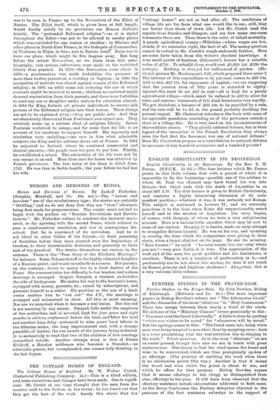THE COTTAGE HOMES OF ENGLAND.
The Cottage Homes of England. By W. Walter Crotch. (Industrial Publishing Company. ls.)—This is a third edition, and some corrections and changes have been made. One is signifi- cant. Mr. Crotch at one time thought that the men from the country sank to the bottom in the towns ; he has found out that they get the best of the work. Surely this shows that the "cottage homes" are not so bad after all. The conditions of village life are far from what one would like to see ; still, they are better than those of town life. Let Mr. Crotch read the reports from Dundee and Glasgow, and see how many one-room tenements there are. Then there is the ratio of infant mortality. A purely agricultural county—Wiltshire—where wages are low, stands, if we remember right, the best of all. The money question cannot be solved in Mr. Crotch's rough-and-ready fashion. Here are some facts taken from the writer's absolute knowledge. A very small parish of fourteen (labourers') houses has a rateable value of £750. To rebuild them would cost £1,820 (at £130 the cottage). Nothing is charged for half-a-rood of garden. (Mr. Crotch praises Mr. Mackarness's Bill, which proposed three acres I) The interest of this expenditure at 3,1 rer cent. comes to £63 14e. Add to this £22 15s. for repayment of capital,—we are supposing that the present term of fifty years is extended to eighty. Against this must be set £42 in rent—£3 is high for a purely agricultural village—which 'must be reduced to £30 to allow for rates and repairs ; tenements of this kind deteriorate very rapidly. We get, therefore, a balance of £56 10s. to be provided by a rate, and the rate will be ls. 6d. in the pound, probably doubling the present impost. Mr. Chesterton introduces the book with some of his agreeable paradoxes, reminding us of the performer outside a show at a village fair. He is very hard on the inconsistencies of the wealthier classes. " They glorify national defence, but in their legend of the atrocities' of the French Revolution they always miss the fact that the fierceness was one of national defence." Does Mr. Chesterton propose as a contribution to national defence to massacre claven hundred aristocrats and a hundred priests ?
























































 Previous page
Previous page